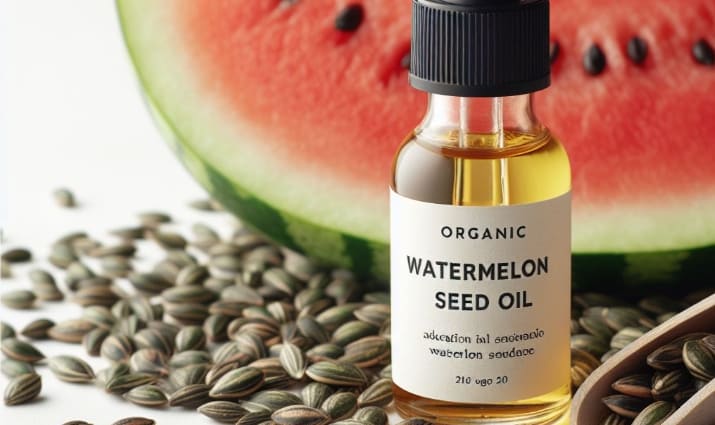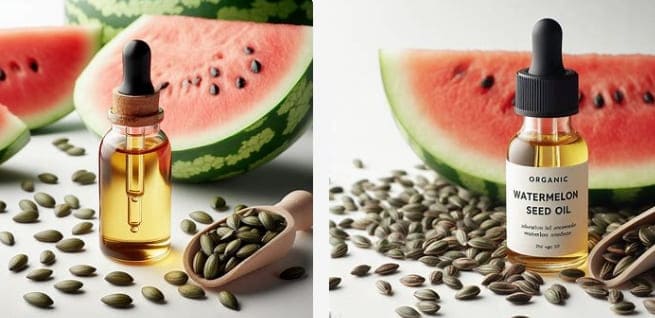
Watermelon oil, popularly called watermelon seed oil, has gained popularity in recent years due to its numerous health and skincare benefits. Extracted from the seeds of the watermelon fruit, this natural oil is rich in essential fatty acids, vitamins, and antioxidants, making it a powerful addition to your daily routine.
Read on to learn the various benefits of watermelon oil and how you can incorporate it into your skincare and wellness practices.
Understanding Watermelon Oil
Watermelon oil is obtained through a cold-pressing method, ensuring that its nutrients and properties remain intact. It contains essential fatty acids like omega-6 and omega-9, as well as vitamins A, B, and E. These components contribute to the oil’s exceptional benefits for both the skin and overall health. There are different varieties of watermelon oil, including refined and unrefined options. Refined watermelon oil undergoes further processing to remove impurities, while unrefined watermelon oil retains its natural state and is considered of higher quality.
Nutritional Benefits of Watermelon Oil
Watermelon oil, extracted from the seeds of the luscious fruit, boasts a remarkable nutritional profile, making it a valuable addition to both skincare and dietary regimens.
1. Rich in Polyunsaturated Fatty Acids: Linoleic and Oleic Acid Powerhouse
The composition of watermelon oil stands out for its richness in polyunsaturated fatty acids, with linoleic acid and oleic acid taking the lead. Linoleic acid, an omega-6 fatty acid, is crucial for maintaining skin health by supporting the skin barrier, preventing moisture loss, and promoting a supple complexion. Oleic acid, an omega-9 fatty acid, contributes to the oil’s emollient properties, aiding in skin hydration and overall skin softness.
2. Essential Fatty Acids for Skin Nourishment and Repair
Watermelon oil is a potent source of essential fatty acids, including omega-3, omega-6, and omega-9. These fatty acids play a vital role in skin nourishment and repair. Omega-3 supports skin health by promoting elasticity, reducing inflammation, and contributing to a more youthful appearance. Omega-6, particularly linoleic acid, helps maintain the skin barrier, preventing dehydration and supporting overall skin function. Omega-9, like oleic acid, enhances the moisturizing capabilities of watermelon oil, contributing to skin softness and suppleness.
3. Antioxidants Galore: Fighting Free Radicals for Skin Protection
Watermelon oil is endowed with antioxidants that combat free radicals, the culprits behind premature aging and skin damage. The presence of antioxidants, such as lycopene, helps neutralize oxidative stress, protecting the skin from environmental aggressors like UV rays. This protective shield contributes to reducing the appearance of fine lines, wrinkles, and sunspots, promoting a more radiant and youthful complexion.
4. Mineral Bounty: Supporting Skin Vitality
In addition to fatty acids and antioxidants, watermelon oil contains essential minerals, including magnesium, phosphorus, and potassium. These minerals play a crucial role in maintaining skin vitality. Magnesium contributes to the overall health of skin cells, while phosphorus aids in energy metabolism. Potassium, known for its hydrating properties, helps regulate skin moisture and supports a healthy water balance in skin cells.
Incorporating watermelon oil into your skincare routine or utilizing it as a culinary oil can provide your skin and body with these essential nutrients. Whether applied topically or consumed, the nutritional benefits of watermelon oil contribute to overall well-being and health.
Skin, Hair and Health Benefits of Watermelon Oil

Here are the significant benefits of watermelon oil:
1. Skin Nourishment and Hydration: Omega Fatty Acids for Radiant Complexion
Watermelon oil emerges as a skincare powerhouse, offering unparalleled benefits for skin nourishment and hydration. Packed with omega-6 and omega-9 fatty acids, watermelon oil provides essential building blocks for maintaining a healthy skin barrier. These fatty acids contribute to the lipid layer that seals in moisture, preventing dehydration and promoting a radiant complexion.
To enjoy the skin-nourishing benefits of watermelon oil, incorporate it into your skincare routine. Gently massage a few drops onto cleansed skin, allowing the oil to absorb. Alternatively, blend it with your favorite moisturizer or use it as a hydrating ingredient in DIY face masks. By making watermelon oil a staple in your skincare regimen, you’re not just pampering your skin but potentially supporting its natural moisture balance for a luminous and supple appearance.
2. Antioxidant Defense Against Aging: Vitamin E for Youthful Vigor
Watermelon oil stands out as an antioxidant-rich elixir, particularly due to its high vitamin E content. Vitamin E is a potent antioxidant that combats free radicals, the culprits behind premature aging. By neutralizing these free radicals, watermelon oil helps protect the skin from oxidative stress, reducing the appearance of fine lines and wrinkles.
To harness the anti-aging benefits of watermelon oil, apply it to your skin as a part of your daily skincare routine. Consider using it as a nighttime treatment or blending it with your favorite anti-aging moisturizer. By incorporating watermelon oil into your skincare regimen, you’re not just fighting the signs of aging but potentially promoting a more youthful and vibrant complexion.
3. Scalp and Hair Health: Essential Nutrients for Lustrous Locks
Beyond skincare, watermelon oil extends its benefits to hair and scalp health. Rich in essential fatty acids, vitamins A and C, and amino acids, watermelon oil provides a nutrient-packed formula for maintaining lustrous locks and a healthy scalp. The fatty acids nourish the hair shaft, promoting strength and shine, while the vitamins support overall scalp health, preventing issues like dryness and flakiness.
To incorporate watermelon oil into your hair care routine, apply a few drops to your scalp and massage it through your hair. You can also add it to your regular conditioner or use it as an overnight treatment. By regularly indulging your hair and scalp with watermelon oil, you’re not just nurturing your strands but potentially achieving a mane of healthy, vibrant hair.
4. Inflammation Soother: Linoleic Acid’s Calming Effect
Watermelon oil unveils its prowess as an inflammation soother, thanks to its high linoleic acid content. Linoleic acid, an omega-6 fatty acid, plays a crucial role in modulating the body’s inflammatory response. Incorporating watermelon oil into your skincare routine can help calm irritated skin, reduce redness, and alleviate conditions such as acne and eczema.
To experience the inflammation-soothing benefits, apply watermelon oil to clean, dry skin, especially targeting areas prone to inflammation. You can also mix a few drops with your favorite soothing moisturizer. By incorporating watermelon oil into your skincare regimen, you’re not just addressing skin concerns but potentially fostering a complexion that feels calm, balanced, and free from inflammatory challenges.
5. Scar Tissue Remedy: Regenerative Properties of Palmitic Acid
Watermelon oil proves to be a natural remedy for scar tissue, thanks to its palmitic acid content. Palmitic acid, a saturated fatty acid, contributes to the regenerative properties of watermelon oil. Applying the oil to scars or areas with hyperpigmentation can help promote cell regeneration, potentially reducing the appearance of scars and encouraging a more even skin tone.
To harness the scar tissue remedy, gently massage watermelon oil onto the affected areas daily. You can also blend it with carrier oils known for their skin-regenerating properties. By consistently using watermelon oil for scar care, you’re not just nurturing your skin but potentially supporting its natural healing processes for a smoother and more even complexion.
6. Moisture Sealant: Oleic Acid’s Hydrating Embrace
Watermelon oil serves as a moisture sealant, thanks to its oleic acid content. Oleic acid, an omega-9 fatty acid, forms a protective barrier on the skin, preventing moisture loss and promoting long-lasting hydration. This makes watermelon oil an excellent choice for individuals with dry or dehydrated skin, helping to lock in essential moisture for a plump and supple complexion.
To enjoy the moisture-sealing benefits, apply watermelon oil to damp skin after cleansing. You can also mix it with your favorite hydrating serum or moisturizer. By incorporating watermelon oil into your skincare routine, you’re not just quenching your skin’s thirst but potentially maintaining a healthy and well-hydrated complexion.
7. Acne Fighter: Citrulline’s Antibacterial and Anti-Inflammatory Punch
Watermelon oil takes on the role of an acne fighter, owing its efficacy to the presence of citrulline. Citrulline, a potent amino acid, exhibits antibacterial and anti-inflammatory properties, making it a valuable ally in the battle against acne. Applying watermelon oil to blemish-prone areas can help combat acne-causing bacteria, reduce inflammation, and promote a clearer complexion.
To harness the acne-fighting benefits, incorporate watermelon oil into your skincare routine. Apply a small amount directly to affected areas or mix it with your preferred acne-fighting products. By consistently using watermelon oil, you’re not just addressing existing acne but potentially preventing future breakouts, leading to a healthier and clearer skin appearance.
8. Sun Damage Repair: Lycopene’s Skin-Protective Shield
Watermelon oil emerges as a sun damage repair solution, courtesy of its lycopene content. Lycopene, a powerful antioxidant found in watermelon oil, helps neutralize free radicals generated by UV exposure. This antioxidant action contributes to repairing sun-damaged skin, reducing the appearance of sunspots, and promoting a more even skin tone.
To enjoy the sun damage repair benefits, apply watermelon oil to sun-exposed areas regularly. You can also blend it with other skin-repairing oils or use it as an overnight treatment. By incorporating watermelon oil into your skincare routine, you’re not just addressing current sun damage but potentially safeguarding your skin against future UV-induced harm.
9. Eczema Soother: Linoleic Acid’s Skin Barrier Support
Watermelon oil proves to be a soothing remedy for eczema-prone skin, thanks to its linoleic acid content. Linoleic acid plays a pivotal role in maintaining the skin barrier, preventing moisture loss, and reducing inflammation. Incorporating watermelon oil into your skincare routine can help alleviate the discomfort associated with eczema, providing relief to sensitive and irritated skin.
To experience the eczema-soothing benefits, apply watermelon oil to clean, dry skin or mix it with a fragrance-free moisturizer. By consistently using watermelon oil, you’re not just addressing eczema symptoms but potentially supporting a healthier and more resilient skin barrier, leading to increased comfort and well-being.
Incorporating Watermelon Oil into Your Routine

Watermelon oil’s versatile properties make it a valuable addition to various daily routines, from skincare to haircare. Here are practical tips for seamlessly integrating watermelon oil into your health, skincare, and haircare routines.
Practical Tips for Integration:
1. Skincare :
- Application: After cleansing, apply a few drops of watermelon oil to damp skin. Gently massage it in, allowing the oil to absorb for a natural glow.
- Mixing: Blend watermelon oil with your favorite moisturizer or serum for added hydration. This enhances its benefits without altering your existing routine.
- DIY Masks: Create DIY face masks by combining watermelon oil with ingredients like honey or yogurt for a nourishing and revitalizing treat.
2. Hair Nourishment:
- Scalp Massage: Massage watermelon oil into your scalp to promote blood circulation and nourish hair follicles. Leave it on for an hour before washing your hair.
- Conditioning: Add a few drops of watermelon oil to your conditioner for an extra boost of moisture. This helps improve hair texture and manageability.
3. Culinary Delight:
- Salad Dressings: Incorporate watermelon oil into salad dressings for a light, fruity flavor. It not only adds a unique taste but also brings nutritional benefits to your meals.
- Smoothies: Include a small amount of watermelon oil in your smoothies for a healthful twist. It pairs well with other fruits and greens, providing a subtle, refreshing taste.
Conclusion
Watermelon oil is a natural powerhouse that offers numerous benefits for both the skin and overall health. Its moisturizing, anti-aging, and soothing properties make it an excellent addition to any skincare routine. Additionally, it promotes hair health and provides essential nutrients when consumed internally. Incorporate watermelon oil into your daily routine and experience the powerful benefits it has to offer for your well-being and skincare needs.
Related Posts
Citations:
[1] https://www.sciencedirect.com/science/article/abs/pii/B9780123756886101367
[2] https://ginabnutrition.com/veganism/watermelon-seed-oils-the-benefits/
[3] https://www.researchgate.net/publication/325180866_A_comprehensive_review_on_watermelon_seed_oil_-_an_underutilized_product
[4] https://www.sciencedirect.com/topics/agricultural-and-biological-sciences/melon-seed-oil
[5] https://www.ncbi.nlm.nih.gov/pmc/articles/PMC7698065/

































